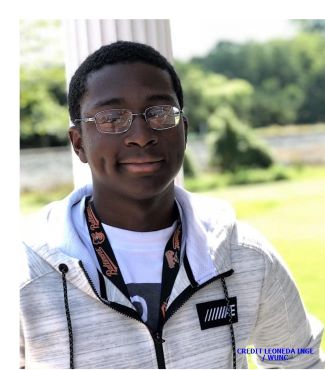
UMES junior eyes career as an environmentalist
Thursday, August 20, 2020
UMES junior Teemer Barry remembers exactly when he realized science might be a good career fit.
Being fitted in elementary school with glasses instantly gave him a clearer view of nature.
“I could see the detail in leaves,” Barry said. He quickly concluded “the sciences are where I need to be.”
Barry soon pivoted to peering through microscopes at the kind of minute creatures that would become the focus of his summer 2020 internship with the National Oceanic and Atmospheric Administration.
From his home in Durham, N.C., his “virtual” assignment involved “visualizing bulk environmental datasets … to help better understand how certain environmental characteristics influence phytoplankton class compositions in highly productive areas.”
Barry utilized “open-source software to analyze phytoplankton communities within the United States’ (northeastern) Continental Shelf” as part of NOAA’s ongoing Joint Polar Satellite Systems study.
His contribution, he says, should help scientists who monitor the world’s oceans track the health of their respective ecosystems reliant on the stability of micro-organisms.
“I think I gained a greater appreciation of how micro-organisms’ role serves to preserve the observable environment,” he said.
Barry was born with sickle cell anemia, an inherited blood disorder that can cause infections, pain and fatigue. In Barry’s case, his eyesight was compromised until being fitted with glasses and he has struggled much of his life with leg pain and walking.
People with sickle cell disease have a heightened vulnerability to the novel coronavirus, so when NOAA offered a virtual way to participate in its coveted college internship programs, Barry sidestepped an obstacle in his journey to become a research scientist.
While he missed out on boarding a research vessel this summer, Barry said the 10-week opportunity nonetheless enabled him to refine his bulk-data collection and analytical skills that he’s confident will be beneficial down the road.
Barry chose to enroll in the University of Maryland Eastern Shore, in part, because it provided a summer science program opportunity to give him a jump-start on undergraduate studies.
His mother, a broadcast journalist in North Carolina, wrote an essay in 2019 for her news outlet about worrying as Barry headed off to college but also having peace of mind knowing UMES pharmacy school dean Rondall Allen, a family friend, is close by in case of a health emergency. Allen and Leoneda Inge-Barry have known each other since childhood, and both earned undergraduate degrees from Florida A&M University.
“He is smart, a diligent worker, and extremely passionate about his major,” Allen said. “He is also very personable and willing to put the needs of others before his own.”
Barry, a member of UMES’ Richard Henson Honors Program, says his first two years have gone smoothly, the pandemic lockdown notwithstanding.
“I wanted to go to a school where I could really get involved in a science program,” he said.
Barry works in the research lab or Dr. Victoria Volkis, who describes him as “an amazing student and a very strong person” who is “smart (and) goal-oriented.”
Volkis has watched Barry struggle at times with physical pain, but notes that he “takes it like a hero (and) never wants any accommodations because of his condition.”
One of Volkis’ current lab projects is “anti-fouling research,” where her group is “preparing formulations from polymers and extracts from super-fruits and medical herbs” that when applied to “boats and platforms, can prevent formation of biofilm” below the water line.
Finding eco-friendly solutions to keep water clean and safe motivates Barry to work toward becoming an environmental scientist.
“The average person should know what’s in their drinking water,” he said. “It’s something I believe is essential to the quality of lives, and something people should not have to worry about.”

